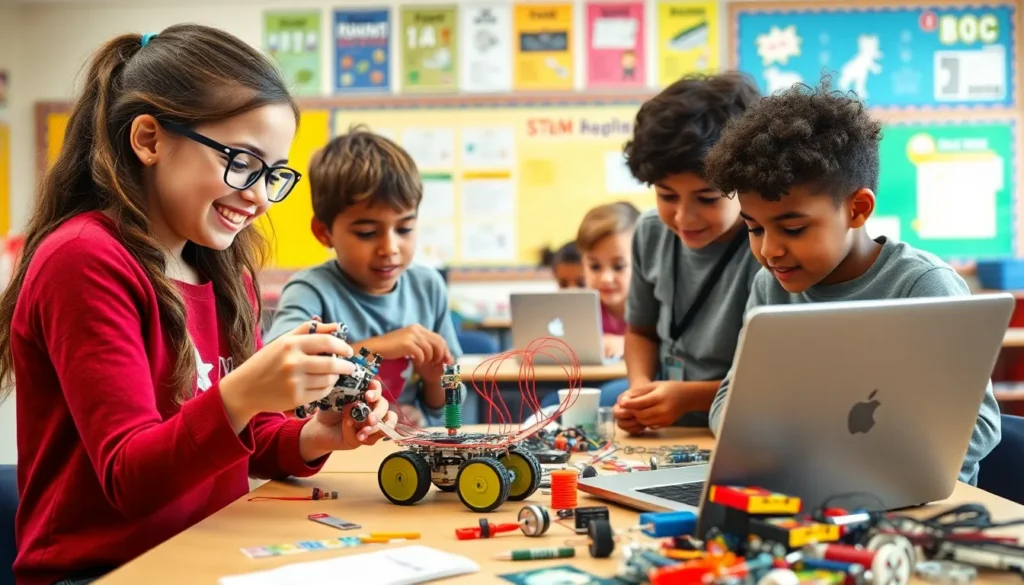Table of Contents
ToggleIn a world where school buses are as rare as unicorns, many parents are taking the plunge into homeschooling. But let’s face it—navigating the sea of homeschool books can feel like trying to find a needle in a haystack. With so many options out there, how do you choose the perfect titles that won’t make your kids groan louder than a Monday morning?
What Are Homeschool Books?
Homeschool books serve as educational resources specifically designed for home-based learning. These materials encompass a wide variety of subjects, including math, science, literature, and history. Parents often select books that align with their children’s learning styles and interests, ensuring a more personalized education experience.
Distinctive titles include workbooks, textbooks, and interactive guides. Workbooks typically contain exercises that reinforce concepts, while textbooks provide comprehensive information about each subject. Interactive guides often include hands-on activities, engaging students in practical learning.
Homeschool books can come from traditional publishers or independent authors, making the selection process more diverse. Many families choose to integrate digital resources, such as eBooks and online courses, alongside printed materials. This hybrid approach often enhances flexibility in learning schedules and formats.
An important aspect of choosing homeschool books involves considering age appropriateness and reading levels. Reading levels can significantly impact a child’s comprehension and retention of information. Engaging narratives often make subjects more appealing and easier to grasp.
Supportive communities, including forums and social media groups, allow parents to share recommendations and experiences regarding various homeschool books. Access to these resources can streamline the selection process and provide insights from other educators.
Types Of Homeschool Books

Homeschool books come in various forms, meeting different educational needs and preferences. Understanding these types helps parents make informed choices that best fit their children’s learning styles.
Curriculum Guides
Curriculum guides serve as comprehensive roadmaps for homeschooling. These resources outline specific educational goals and objectives, making it easier for parents to plan lessons across multiple subjects. Comprehensive curriculum guides often incorporate assessments, suggesting a clear progression for students. Many guides include samples and additional resources, enhancing the overall educational experience.
Supplementary Materials
Supplementary materials provide valuable additional resources to reinforce key concepts. These resources include worksheets, quizzes, and hands-on activities that complement the main curriculum. Engaging storybooks enhance learning in a fun way while fostering creativity and critical thinking. Parents often use these materials to address gaps or expand on topics that capture their children’s interest.
Subject-Specific Books
Subject-specific books focus intensely on individual disciplines. These resources cover mathematics, science, literature, and history in detail, enabling deeper understanding. Each subject-specific book typically offers a range of reading levels, accommodating diverse learners. Authors often tailor the content to spark enthusiasm, making challenging subjects more approachable and enjoyable for students.
Benefits Of Using Homeschool Books
Homeschool books provide numerous advantages for learners. They enhance educational experiences through tailored content and diverse formats.
Personalized Learning
Personalized learning occurs when families select homeschool books based on individual student needs. This customization allows children to engage with materials that resonate with their interests. Each child learns differently, so unique titles can target various learning modalities. Consequently, children often grasp concepts more effectively when exposed to relevant topics. Moreover, homeschool books can adapt to different paces, ensuring students progress at an appropriate rate. Engaging narratives provide motivation and contribute to maintaining focus during lessons.
Flexibility And Variety
Flexibility plays a crucial role in a homeschooling environment. Parents can choose when and where to incorporate lessons, allowing for a structured yet adaptable schedule. Homeschool books offer variety in formats, including interactive guides, eBooks, and traditional texts. These options enable families to switch resources based on preferences or project requirements. Adjusting the curriculum based on seasonal interests or current events can keep learning dynamic and fresh. As a result, children develop a sustained enthusiasm for learning that traditional schooling might not always foster.
Choosing The Right Homeschool Books
Selecting appropriate homeschool books requires careful consideration of various factors, including age appropriateness and learning styles. Making informed choices aligns educational content with children’s developmental stages, promoting effective learning.
Age Appropriateness
Age appropriateness significantly impacts a child’s learning journey. Books tailored to specific age groups ensure that content matches comprehension levels. Younger students benefit from picture books with engaging visuals, while older learners may thrive on more complex narratives. Reading levels must align with a child’s ability; selecting books that challenge yet do not frustrate fosters a positive learning environment. Parents should consider using recommendations from educational experts or resources like public library guidelines when evaluating materials. This practice ensures children remain engaged and grasp essential concepts effectively.
Learning Styles
Identifying individual learning styles enhances the selection of homeschool books. Visual learners often excel with illustrations and diagrams, while auditory learners benefit from read-alouds or audio resources. Kinesthetic learners, on the other hand, prefer interactive materials that encourage hands-on activities. Understanding these differences allows parents to choose books that resonate with each child’s preferred method of learning. Varied formats, such as multimedia content and interactive guides, cater to diverse preferences. This approach not only aids understanding but also promotes sustained interest in subjects, boosting overall educational outcomes.
Top Recommendations For Homeschool Books
Selecting the right homeschool books can significantly impact a child’s learning journey. These resources cater to various educational needs and preferences.
Popular Series
Popular series can captivate young readers and make learning enjoyable. The “Magic Tree House” series introduces children to history and geography through engaging stories. Another well-loved choice is “The Boxcar Children,” which emphasizes problem-solving and teamwork. Parents also favor “Where the Red Fern Grows” and similar books that blend adventure with life lessons. The “I Survived” series presents historical events in exciting narratives, encouraging kids to explore more about the past. Additionally, “The Chronicles of Narnia” combines fantasy with moral themes, appealing to diverse interests while enriching literature studies.
Notable Authors
Notable authors contribute significantly to homeschool literature. Roald Dahl, known for his imaginative tales, keeps readers enthralled with humor and creativity. Patricia Polacco’s books often include themes of family and culture, fostering discussions about diversity. Other prominent figures like Judy Blume tackle relatable childhood experiences, making her works widely relatable. Dr. Seuss creates playful rhymes and illustrations that enchant young learners. Their engaging writing styles help develop literacy skills while sparking an interest in reading. Each author offers unique perspectives, providing a rich tapestry of literature for homeschooling families.
Selecting the right homeschool books is crucial for creating an enriching educational experience. With a variety of options available parents can tailor their choices to fit their children’s unique interests and learning styles. This personalized approach not only enhances comprehension but also fosters a love for learning.
As the homeschooling trend continues to grow parents have access to a wealth of resources that can make lessons engaging and effective. By exploring diverse formats and integrating both traditional and digital materials families can keep education dynamic and enjoyable. Embracing this flexibility empowers children to thrive in their learning journeys.







